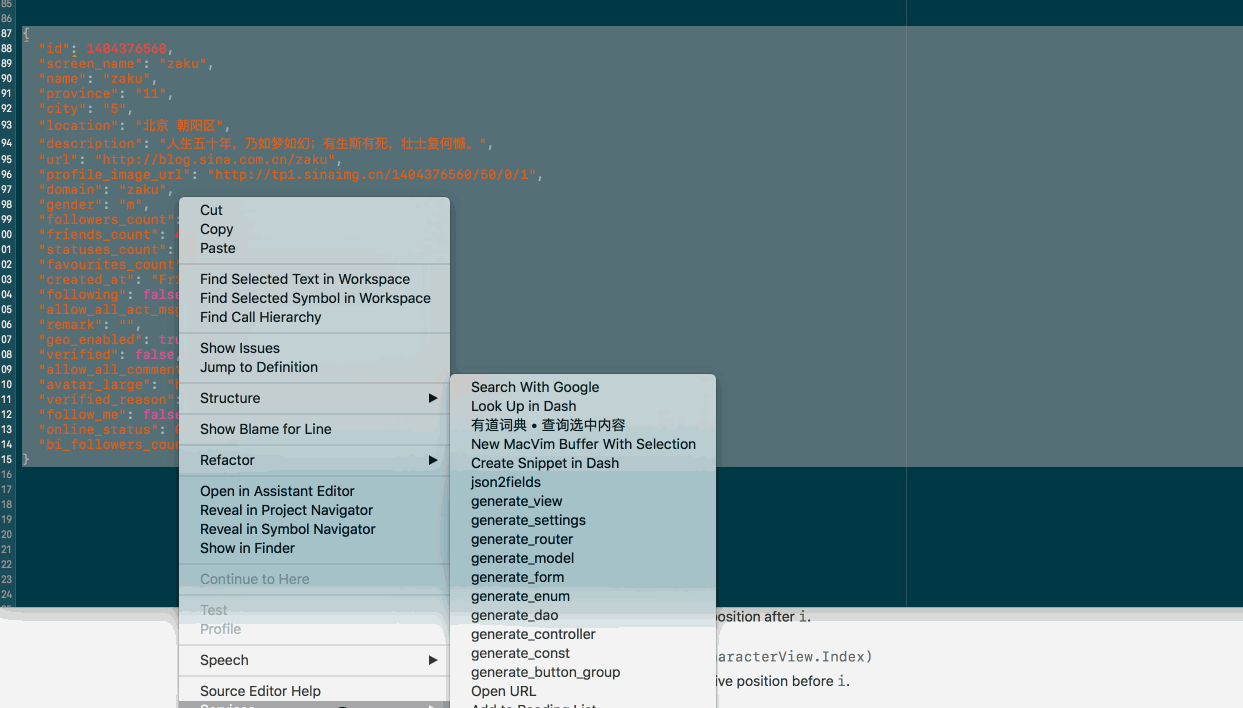Let Code generate Code
这里的目的是自动将 API 的返回转成 Model. 我以 微博 API 为例进行说明: 比如 微博中的用户对象. 其 API 返回 示例如下:
{
"id": 1404376560,
"screen_name": "zaku",
"name": "zaku",
"province": "11",
"city": "5",
"location": "北京 朝阳区",
"description": "人生五十年,乃如梦如幻;有生斯有死,壮士复何憾。",
"url": "http://blog.sina.com.cn/zaku",
"profile_image_url": "http://tp1.sinaimg.cn/1404376560/50/0/1",
"domain": "zaku",
"gender": "m",
"followers_count": 1204,
"friends_count": 447,
"statuses_count": 2908,
"favourites_count": 0,
"created_at": "Fri Aug 28 00:00:00 +0800 2009",
"following": false,
"allow_all_act_msg": false,
"remark": "",
"geo_enabled": true,
"verified": false,
"allow_all_comment": true,
"avatar_large": "http://tp1.sinaimg.cn/1404376560/180/0/1",
"verified_reason": "",
"follow_me": false,
"online_status": 0,
"bi_followers_count": 215
}像这样的 API 返回 结果 , 我们在 应用中 创建一个 User 类,然后根据返回. 一个一个写上. 如:
struct User{
let id:Int
let screenName: String
/// 省略
}写这样的代码就像是做苦力一样. 为此, 我写了一个代码生成脚本. 能够快速的 从 API 生成模型代码.
先来看一发动图, 感受下 从 API 到 Model 是多么的方便.
[
使用的是通过 Automator 创建系统服务的方式来调用脚本
首先执行 将 json 转成 fields ,通过 json_to_fields() 函数 .得到结果如下: 上面是原来的 JSON 的. 以注释的形式保存. 下面是得到的字段列表.
/// {
/// "id": 1404376560,
/// "screen_name": "zaku",
/// "name": "zaku",
/// "province": "11",
/// "city": "5",
/// "location": "北京 朝阳区",
/// "description": "人生五十年,乃如梦如幻;有生斯有死,壮士复何憾。",
/// "url": "http://blog.sina.com.cn/zaku",
/// "profile_image_url": "http://tp1.sinaimg.cn/1404376560/50/0/1",
/// "domain": "zaku",
/// "gender": "m",
/// "followers_count": 1204,
/// "friends_count": 447,
/// "statuses_count": 2908,
/// "favourites_count": 0,
/// "created_at": "Fri Aug 28 00:00:00 +0800 2009",
/// "following": false,
/// "allow_all_act_msg": false,
/// "remark": "",
/// "geo_enabled": true,
/// "verified": false,
/// "allow_all_comment": true,
/// "avatar_large": "http://tp1.sinaimg.cn/1404376560/180/0/1",
/// "verified_reason": "",
/// "follow_me": false,
/// "online_status": 0,
/// "bi_followers_count": 215
/// }
id:d;screen_name;name;province;city;location;description;url:u;profile_image_url:u;domain;gender;followers_count:i;friends_count:i;statuses_count:i;favourites_count:i;created_at;following:i;allow_all_act_msg:i;remark;geo_enabled:i;verified:i;allow_all_comment:i;avatar_large:u;verified_reason;follow_me:i;online_status:i;bi_followers_count:i
将字段列表稍微分一下行, 如下.
id:d;screen_name;name;province;city;location;description;url:u;profile_image_url:u
domain;gender;followers_count:i;friends_count:i;statuses_count:i;favourites_count:i
created_at;following:i;allow_all_act_msg:i;remark;geo_enabled:i;verified:i;allow_all_comment:i
avatar_large:u;verified_reason;follow_me:i;online_status:i;bi_followers_count:i
字段简写的形式是 filedName[:fieldType] 各个字段声明以分号分隔开. fieldType 可以省略,省略则表示为 String 类型.
其他的字段简写说明:
i:Intb:Boold:Doubles:String如果是 String 类型的话,建议不用写,因为这是默认类型.u:URL类型.j:JSON类型.
其他更多类型支持,参见: 代码中 ios_code_generator/maps.py:203 的说明.
然后通过 ,字段名称及类型简写列表生成 Model.
这里假定 JSON 序列化库为 SwiftyJSON
为上模型名称及相应的配置 User(eq,hash), 配置的意思看生成结果应该一目了然.
User(eq,hash)
id:d;screen_name;name;province;city;location;description;url:u;profile_image_url:u;domain;gender;followers_count:i;friends_count:i;statuses_count:i;favourites_count:i;created_at;following:i;allow_all_act_msg:i;remark;geo_enabled:i;verified:i;allow_all_comment:i;avatar_large:u;verified_reason;follow_me:i;online_status:i;bi_followers_count:i
生成出来的代码如下:
import SwiftyJSON
import BXModel
struct User :BXModel{
let id : Int
let screenName : String
let name : String
let province : String
let city : String
let location : String
let description : String
let url : URL
let profileImageUrl : URL
let domain : String
let gender : String
let followersCount : Int
let friendsCount : Int
let statusesCount : Int
let favouritesCount : Int
let createdAt : String
let following : Bool
let allowAllActMsg : Bool
let remark : String
let geoEnabled : Bool
let verified : Bool
let allowAllComment : Bool
let avatarLarge : URL
let verifiedReason : String
let followMe : Bool
let onlineStatus : Int
let biFollowersCount : Int
init(json:JSON){
self.id = json["id"].intValue
self.screenName = json["screen_name"].stringValue
self.name = json["name"].stringValue
self.province = json["province"].stringValue
self.city = json["city"].stringValue
self.location = json["location"].stringValue
self.description = json["description"].stringValue
self.url = json["url"].stringValue.quietUrl
self.profileImageUrl = json["profile_image_url"].stringValue.quietUrl
self.domain = json["domain"].stringValue
self.gender = json["gender"].stringValue
self.followersCount = json["followers_count"].intValue
self.friendsCount = json["friends_count"].intValue
self.statusesCount = json["statuses_count"].intValue
self.favouritesCount = json["favourites_count"].intValue
self.createdAt = json["created_at"].stringValue
self.following = json["following"].boolValue
self.allowAllActMsg = json["allow_all_act_msg"].boolValue
self.remark = json["remark"].stringValue
self.geoEnabled = json["geo_enabled"].boolValue
self.verified = json["verified"].boolValue
self.allowAllComment = json["allow_all_comment"].boolValue
self.avatarLarge = json["avatar_large"].stringValue.quietUrl
self.verifiedReason = json["verified_reason"].stringValue
self.followMe = json["follow_me"].boolValue
self.onlineStatus = json["online_status"].intValue
self.biFollowersCount = json["bi_followers_count"].intValue
}
func toDict() -> [String:Any]{
var dict : [String:Any] = [ : ]
dict["id"] = self.id
dict["screen_name"] = self.screenName
dict["name"] = self.name
dict["province"] = self.province
dict["city"] = self.city
dict["location"] = self.location
dict["description"] = self.description
dict["url"] = self.url.absoluteString
dict["profile_image_url"] = self.profileImageUrl.absoluteString
dict["domain"] = self.domain
dict["gender"] = self.gender
dict["followers_count"] = self.followersCount
dict["friends_count"] = self.friendsCount
dict["statuses_count"] = self.statusesCount
dict["favourites_count"] = self.favouritesCount
dict["created_at"] = self.createdAt
dict["following"] = self.following
dict["allow_all_act_msg"] = self.allowAllActMsg
dict["remark"] = self.remark
dict["geo_enabled"] = self.geoEnabled
dict["verified"] = self.verified
dict["allow_all_comment"] = self.allowAllComment
dict["avatar_large"] = self.avatarLarge.absoluteString
dict["verified_reason"] = self.verifiedReason
dict["follow_me"] = self.followMe
dict["online_status"] = self.onlineStatus
dict["bi_followers_count"] = self.biFollowersCount
return dict
}
}
extension User: Equatable{
static func ==(lhs:User,rhs:User) -> Bool{
return lhs.id == rhs.id
}
}
extension User : Hashable{
var hashValue:Int{ return id.hashValue }
}项目其他生成脚本的使用说明,稍后更新.